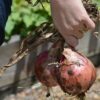Earlier this week, we re-listed mangos on the Farmizen app. Yes it is September and mangoes are supposed to be out of season, but when I heard that we were listing them again, I didn’t even care to ask how or why. I knew they were going live Sunday morning so as I sat down with my breakfast and opened the app to put in my pre-order, already dreaming about the juicy goodness that awaited me, my hopes came crashing down.
SOLD OUT! It couldn’t be?? Desperately, I refreshed my app. Hoping that this was some kind of mistake. But as my colleague later informed me, this was no mistake. The entire batch had been sold out within minutes of listing.
It was only once I had calmed myself down that my rational mind started to kick in again. How in the world were we getting mangos in September? And that too completely naturally grown mangos, no chemical trickery here.
The mangoes we were listing were a local variety of mango called Purnavasu. The farmer who grows it grows, Kesar mangos during season and this local variety during the off season.
As Dr. Roshini Nayar, Scientist Emeritus from the Indian Agricultural Research Institute explains, local varieties of fruits are those that have adapted to the conditions of the region, making them hardier and more resistant to common diseases and pests.
These local varieties are selected by local growers and farmers by selectively breeding these unique varieties.Some of these varieties are grown from heirloom seeds which means that they have been grown over generations whose saved seeds produce plants with consistent traits. Their intense flavor puts them in a class of their own. Over time these local varieties have the potential to get GI certification like the famous Nagpur Oranges and Thrissur Nendran Bananas. These crops then become great cash earners for the local farmers due to increased demand for these varieties.
There are many examples of these local varieties being adapted into local cuisines – like the ‘kanni mangas’ and ‘vadu mangas’ (small young mangos) which are a favourite for pickling all over South India or the semi ripe mangoes used to make pachadis.
Local varieties of mangoes are also more resistant to climate change and are good indicators of the extent of climatic impact on the region. They respond to climate change by changing their flowering and fruiting cycles. On-farm conservation is the best way to preserve these local varieties and we should support them.
About the farmer
Punarvasu mangoes listed on the Farmizen app were grown by Dr. Somappa from Karnataka. Being a veterinary doctor, he noticed rising levels of reproductive issues in animals from the region. He suspected that it may have something to do with their diet so he took some samples of the hay that they were being fed which was the residue from paddy cultivation and sent it for laboratory testing. This confirmed his suspicions about high levels of chemical residue in the feed. Alarmed by the effect of the chemicals on animals, he grew greatly concerned about the health of the humans consuming these products. This is when he decided to buy his own farm and start cultivating his own produce using natural farming techniques.
He sourced 500 saplings of a locally grown mango variety which was known to fruit twice a year and planted them on his 6 acre farm. This particular variety was known to be quite sour and mainly suitable for pickling. This is why he was discouraged by many farmers in the area from growing it. What he found was that due to his natural farming techniques, the mangoes ripened beautifully into juicy, sweet mangoes which he has now christened Punarvasu.
He is using his success story to try and convince other farmers in his area to switch to natural farming and abandon the prevalent chemical farming practices.
So when you place your order for the next batch of Punarvasu mangoes, you will know that you are supporting the cultivation of this great local variety of mango and supporting the cause of this visionary farmer.

Comment